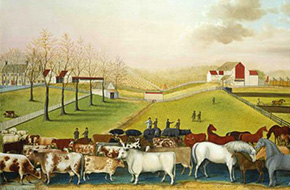Abby Goode

Abby Goode is the author of Agrotopias: An American Literary History of Sustainability (UNC Press, 2022). Her research appears in venues such as Early American Literature, ESQ, Studies in American Fiction, and American Studies in Scandinavia. Her work has been supported by fellowships from the American Council of Learned Societies (ACLS), the American Association of University Women (AAUW), the American Antiquarian Society, the Institute for Citizens and Scholars, and the First Book Institute at the Center for American Literary Studies at Penn State. As an English professor at Plymouth State, Dr. Goode teaches courses in American literature, critical theory, wilderness literature, writing and sustainability, and American food issues. She is a recipient of Plymouth State's Transformative Teaching Award and Distinguished Scholarship Award.
Contact
Abby Goode
algoode@plymouth.edu
Available Program Formats: In person or online presentations
Abby Goode's Programs

Rethinking the U.S. National Parks
In the famous words of Wallace Stegner, “national parks are the best idea we ever had. Absolutely American, absolutely democratic, they reflect us at our best rather than our worst." But are National Parks truly “democratic”? Who has access to National Parks and what kinds of fantasies do they serve? This interactive program explores the history of U.S. National Parks—as myths, symbols of democratic ideals, and colonial spaces—alongside today’s common National Park activities. Why are visitation rates on the rise? What are we seeking at the National Parks? What do our National Park consumption habits tell us about ourselves? We will look at the rising phenomenon of “selfie deaths,” as well as the broader role of social media in National Park consumption. National Parks may represent freedom for some, but no matter how carefully tended and regulated, they also form part of a planet in crisis. How does climate change fundamentally threaten National Parks, challenging their status as highly valued, protectable spaces? How might we revise the preservation tradition that gave birth to the National Parks to include our own neighborhoods and communities? We will consider these questions in the national context, but also in light of our own state—home to the White Mountain National Forest, which attracts so many eager visitors every year.

Sustainability: An American Literary History
What is sustainability? And how has American literature shaped our understanding of this concept, in ways both surprising and disturbing? This interactive program begins with a discussion of current ideas about sustainability. Then, we will go back in time to examine Thomas Jefferson's vision of American agricultural abundance, which he contrasted with an overpopulated and under-resourced Europe. Throughout the 19th and early 20th centuries, writers such as Walt Whitman and Charlotte Perkins Gilman drew on Jefferson's agrarian vision to respond to sustainability crises of their time. But in so doing, they depicted selective breeding and racial "improvement" as the solution to population crises and the path to agricultural plenty. We will explore this particularly eugenic conception of sustainability and discuss what new or different versions of sustainability might prove more useful in our current moment.